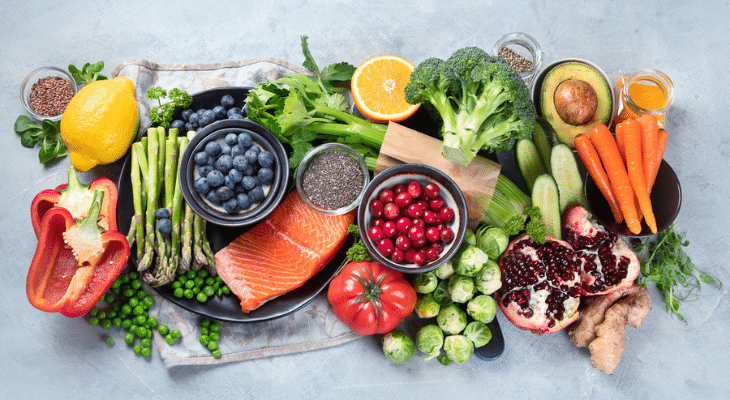How Diet Affects Vision
-
Created in
Newsletters

The Importance of Nutrition in Maintaining Your Eye Health
Food is more than just fuel for your body. The foods you eat could help you improve your health and reduce your risk of a variety of health conditions, including disorders and diseases that affect your vision.
A Healthy Diet Protects Your Eyesight
Food provides nutrients that help to keep every part of your eye healthy. If your diet consists mostly of fried, fatty, processed, or sugary foods, your eyes may suffer, as a teenage boy in the United Kingdom discovered a few years ago. The boy ate a diet that consisted solely of French fries, ham slices, sausage, potato chips, and white bread for years. The diet decreased his B12, vitamin D, copper, and selenium levels while raising his zinc level.
By the time he was 17, his poor diet choices had caused permanent vision loss due to optic nerve damage, according to University of Bristol researchers. The optic nerve carries electrical impulses from the eyes to the brain.
Fortunately, you can avoid a similar fate if your diet includes foods that contain:
- Vitamin C. Add oranges, strawberries, broccoli, Brussels sprouts, and other foods high in vitamin C to your diet to sharpen your vision and reduce your risk of age-related macular degeneration. AMD causes blurred or blank spots in your central vision and is the leading cause of loss of vision in older people, according to the National Eye Institute.
- Vitamin B. Vitamin B6, B12, and other B vitamins are essential for a healthy retina and optic nerve. They also lower your AMD risk. Increase your intake of B vitamins by choosing recipes that feature salmon, spinach, liver, beef, chicken, turkey, yogurt, black beans, milk, oysters, collard greens, and clams.
- Vitamin D. Vitamin D lubricates your eyes and relieves dry eye symptoms. It may also reduce your risk of AMD and uveitis. Uveitis is a painful inflammation in the middle of the eye that causes blurred vision, floaters, and red eyes. Foods that contain vitamin D include tuna, mackerel, salmon, fortified orange juice, cereal, and milk.
- Vitamin E. Vitamin E also reduces your risk of AMD and may slow the progression of cataracts. Cataracts occur when the normally clear lens inside your eye becomes cloudy. Add red bell peppers, sunflower oil, spinach, avocados, pecans, cereal, mangos, and wheat germ to your shopping list to protect your eyes.
- Lutein and Zeaxanthin. These nutrients also offer protection against cataracts and AMD. They can be found in squash, broccoli, asparagus, eggs, grapes, peas, pumpkins, and green leafy vegetables. Lutein and zeaxanthin are two of the ingredients included in AREDS2 supplements recommended for people who have AMD. The supplements may prevent intermediate AMD from turning into late AMD, according to the National Eye Institute. AREDS2 supplements, available at drugstores, also contain zinc, copper, and vitamins C and E.
- Omega Fatty Acids. Omega fatty acids keep your eyes comfortably moist and are essential for the health of your retina, in addition to offering some protection from AMD and diabetic retinopathy. Stock up on flaxseed oil, canola oil, tofu, oysters, salmon, shrimp, trout, and soybeans to ensure that you’re getting enough of these crucial fatty acids.
- Beta-Carotene and Vitamin A. Eye-friendly beta-carotene is found in carrots, sweet potatoes, spinach, cantaloupe, broccoli, lettuce, and tomatoes. Your body converts beta-carotene into vitamin A, a vitamin essential for eye health.
The ideal diet includes plenty of fresh fruits and vegetables, whole grains, low-fat dairy products, healthy fats, poultry, fish, and lean meats. Although everyone enjoys a sweet treat from time to time, including too much sugar or carbohydrates in your diet could increase your risk of developing diabetes.
High levels of glucose (blood sugar) not only raise your risk of heart attack, stroke, and kidney damage but can also lead to vision loss if you have diabetes. As your blood sugar rises, blood vessels inside your eye may leak, causing blurred vision. Luckily, a healthy diet will reduce your risk of developing diabetes-related eye conditions and other diseases that affect your vision.
In addition to making healthy food choices, regular visits to the optometrist will help you protect your eyes. Are you due for an eye exam? Give us a call to arrange your visit.
Sources:
University of Bristol: Poor Diet Can Lead to Blindness, 9/3/2019
National Eye Institute: Age-Related Macular Degeneration, 6/22/2021
National Eye Institute: AREDS2 Supplements for Age-Related Macular Degeneration, 6/22/2021
American Academy of Ophthalmology: Diet and Nutrition, 11/2/20
Review of Optometry: Vitamin D Deficiency and Dry Eye Go Hand in Hand, 10/10/18
